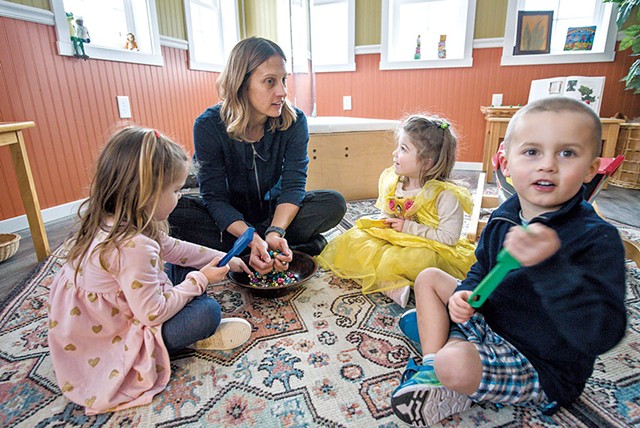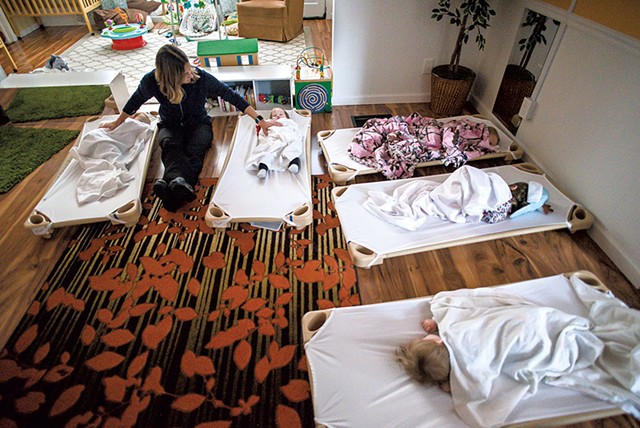
- Glenn Russell
- Kate Driver playing with 3-year-olds Lacey, Sadie and Tucker at Georgia's Next Generation
When it opened in October, Georgia's Next Generation was supposed to alleviate an acute demand for daycare in the area.
Franklin County is one of only four counties in the state with a growing population of kids ages 5 and under. But the total number of daycare slots there dropped 16 percent between 2015 and 2018, according to a legislative report that was released in November.
Fully staffed and supplied, Georgia's Next Generation garnered a high three-star rating from the Department for Children and Families. But the facility is only half occupied. Twenty-four of its 42 slots are empty because of a long-running dispute with state regulators over securing a permit for its water system.
The delay affects a couple dozen families in Franklin County. "We have parents who are like, 'I'm not going to be able to go back to work,'" said Georgia's Next Generation director Kate Driver.
But the situation also reflects the broader statewide childcare crisis. Across Vermont, daycare availability has decreased 7 percent, according to the same legislative report that showed Franklin County's double-digit drop. In the upcoming session, advocates plan to push legislation for more state funding to help childcare centers remain financially viable and attract and retain staff.
"Families can't afford to pay more than they're paying for childcare, and early educators can't afford to make less than they are making, so we need to figure out how we can direct more resources to the issue," said Janet McLaughlin, interim CEO of Let's Grow Kids, a Burlington childcare advocacy group. "It impacts kids, families, employers struggling to recruit employees and our economy as a whole."
Back in Franklin County, another childcare center, Going Places Learning Center in Fairfax, announced last week that it would close in January, leaving about 20 families scrambling for new arrangements.
Going Places Learning Center owner Peggy Feerick said she is going out of business because of a problem many providers cite: an inability to hire enough qualified staff.
Feerick has been employing only three teachers instead of her desired eight, despite having advertised job openings for months. As a result, she has filled only 19 of her 50 child slots, which didn't generate enough revenue to keep the business open.
She cited a 2016 state regulation that many daycare providers said has made it tougher to retain staff. The rule requires that top-tier teachers in childcare centers have at least 21 college credits in an applicable field of study, and it increased education requirements for most other childcare staffers. While few oppose having better-credentialed childcare providers, people with those qualifications tend to demand higher salaries than childcare centers can afford.
"I can't find staffing that meets that qualification that want to come to Fairfax and Franklin County," Feerick said. "They're not going to work for $12, $13 an hour." Paying more would mean charging more, which is not an option for many of her customers. "The parents are all devastated. Some of them say to me, 'Do you understand how hard it is to get childcare?' It hurts me to hear that, because there's nothing I can do."
McLaughlin said staff shortages plague many daycare centers, though she noted that the decline in childcare slots started long before the 2-year-old rule was implemented.
Among Vermont parents, stories of scrambling for daycare are legion. Getting on a wait list halfway through pregnancy is often too late — many parents secure spots while still trying to get pregnant.

- Glenn Russell
- Kate Driver soothing sleepy children during nap time
While working at a South Burlington daycare center last year, Driver got a call from an excited woman. Her home pregnancy test result was positive. She hadn't even told her husband yet but wanted to make sure she got on a daycare list.
"That's how crazy it is," Driver said.
The enormity of the need makes the situation at Georgia's Next Generation that much more frustrating.
In mid-December, an infant in the back room whimpered quietly. Outside by a gazebo, a few toddlers in heavy coats and hats ran around scooping up snow with spoons in a game without any evident rules. But in a room for 2- and 3-year-old children, all was quiet. Buckets filled with untouched crayons rested atop gleaming wooden tables. Toy race cars stood ready to be flung across the carpet, and a tiny kitchenette gathered dust in a corner.
The problem? The property relies on well water. The childcare operators assumed it would pose no obstacle when they signed a lease with the building's owner and took over the former restaurant last year. It had never flunked a safety test or caused a problem, and the system was good enough when the building was home to the Georgia House of Pizza.
But the permit application quickly hit a snag with the Vermont Agency of Natural Resources. The agency has stricter requirements for the water systems at daycare centers, where the kids drink from the same source every day, than restaurants, where patrons aren't regular users.
As a result, systems at childcare centers are required to have more advanced features for treating water with chlorine or UV light.
State regulators allowed Georgia's Next Generation to operate with 18 kids but are insisting that the center install a more robust water system, which costs around $15,000, before operating at full capacity. The center is in the process of purchasing a system.
To put parents at ease, Georgia's Next Generation provides bottled water to the children who currently attend. The center has asked permission to fully open and keep using bottled water while waiting for an official permit.
But Tim Raymond, chief of engineering and operations at the Department of Environmental Conservation's drinking water division, said state and federal rules prohibit such an approach.
Georgia's Next Generation owners accuse the state of foot-dragging and prioritizing a thicket of regulations over the practical need for daycare.
"The parents are screaming; the community is screaming. You can't tell me there's not a way," said co-owner David LeBlanc. "It's disheartening. The water is fine."
Raymond disagreed.
"It comes down to your philosophy: Do you think regulatory oversight provides for better quality drinking water systems? I do," Raymond said. Still, the DEC understands childcare is in crisis and is working hard with licensing officials and those who want to run facilities, he said.
Water problems have caused headaches for other childcare centers, state officials said.
"We always say to applicants, 'Connect with the Agency of Natural Resources first,'" said Christel Michaud, director of childcare licensing for the Department for Children and Families. "If you don't know a lot about what's needed for a water permit, in this instance, the site may have seemed ideal. It's an example of needing to know what you have, like you would with any other aspect of choosing a building."
Meanwhile, Franklin County parents are scrambling. One grandmother of a child who was slated to join Georgia's Next Generation is planning to quit her job to provide childcare, Driver said.
Tiffany Davis' 3-year-old daughter already receives care at Georgia's Next Generation, and Davis had been planning to send her infant son there after her maternity leave ends in January. Davis can't afford not to return to work and is reaching out to friends and family to see if they can watch her son until Georgia's Next Generation can accept more children.
So, instead of spending her last weeks of maternity leave enjoying time with her baby or relaxing for the holidays, Davis is frantically searching for childcare.
The owners of Georgia's Next Generation might end up taking over Going Places Learning Center, but by press time they had not made a decision.














Comments (6)
Showing 1-6 of 6
Comments are closed.
From 2014-2020, Seven Days allowed readers to comment on all stories posted on our website. While we've appreciated the suggestions and insights, right now Seven Days is prioritizing our core mission — producing high-quality, responsible local journalism — over moderating online debates between readers.
To criticize, correct or praise our reporting, please send us a letter to the editor or send us a tip. We’ll check it out and report the results.
Online comments may return when we have better tech tools for managing them. Thanks for reading.